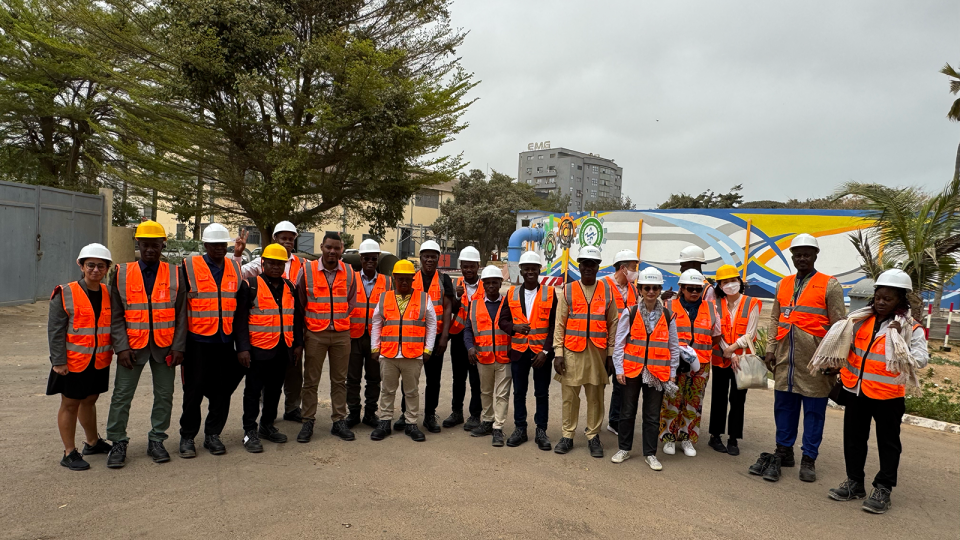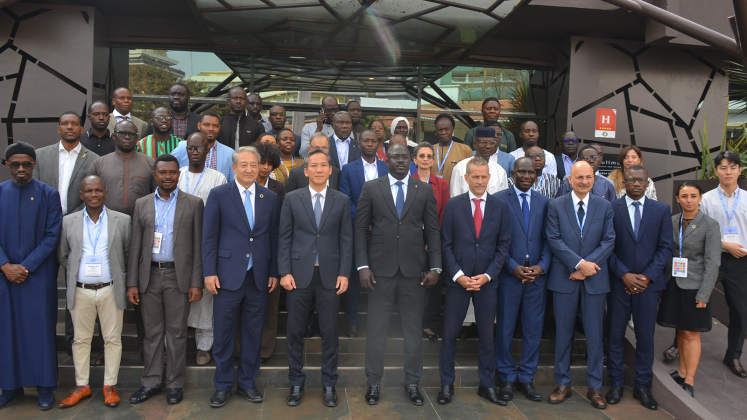Dakar, Senegal, 28-30 April 2025 - The Africa Regional Workshop on “Using SDG 6 Policy Support System (SDG-PSS) to support countries in Africa for water-related sustainable development” was held in Dakar from 28 to 30 April 2025, bringing together representatives from 17 African countries to strengthen regional cooperation and accelerate progress toward Sustainable Development Goal 6 (SDG 6), ensuring sustainable management of water and sanitation for all.
Co-organized by the United Nations University Institute for Water, Environment and Health (UNU-INWEH), the United Nations Office for Sustainable Development (UNOSD), and supported by the Government of Korea, the Korea Water Resources Corporation (K-water), UNESCO International Centre for Water Security and Sustainable Management, UNESCO i-WSSM and Global Affairs Canada, the workshop served as a platform for knowledge exchange, regional dialogue, and collaboration on water-related governance and policymaking across Africa.
Representatives from Tunisia (Africa region hub country), Senegal (host), and 15 other nations – including Chad, Democratic Republic of Congo, Eswatini, Gambia, Guinea-Bissau, Côte d'Ivoire, Lesotho, Madagascar, Mali, Malawi, Mozambique, Sierra Leone, Togo, Zimbabwe, and Zambia – participated in technical discussions and working sessions on using the SDG 6 Policy Support System (SDG-PSS).
Opening remarks were delivered by distinguished dignitaries, including H.E. Mr. Amadou Salmone Fall, Chief of Staff to the Minister of Water and Sanitation of Senegal; H.E. Mr. Hyuk-woon Kwon, Ambassador of the Republic of Korea to Senegal; and H.E. Mr. Marcel Lebleu, Ambassador of Canada to Senegal. Additionally, remarks were given by Mr. Chun Kyoo Park, Head of Office, UNOSD; Dr. Manzoor Qadir, Deputy Director, UNU-INWEH; and Ms. Ageazit Teka Gebreslassie, Senior Monitoring, Evaluation, and Reporting Officer, African Ministers’ Council on Water (AMCOW). The speakers highlighted the urgency of accelerating progress toward SDG 6, particularly as the global community has surpassed the halfway point to the 2030 deadline. They called for enhanced collaboration across sectors and borders to tackle Africa’s pressing water challenges.
A keynote address was delivered by Dr. Mohamed Diatta, Senegal’s Sherpa for the UN 2026 Water Conference. He outlined the preparatory process for the landmark event, which will be co-hosted by Senegal and the United Arab Emirates from 2–4 December 2026. Stressing the importance of water as a catalyst for development and a key concern in the Global South, Dr. Diatta urged countries to seize this opportunity to transform political momentum into practical action.
Throughout the three-day workshop, participants engaged in interactive sessions on how to effectively use the SDG-PSS to map gaps, assess progress, and build evidence for better policy decisions in water and sanitation. The SDG-PSS tool, now used or considered by over 60 countries globally, enables countries to evaluate six key components of their enabling environments: capacity, finance, institutions, gender, resilience, and integrity. Its systematic and multilingual approach supports countries with limited or fragmented data to strengthen national policy coherence and inform investment and planning priorities.
Participants also explored ways to foster regional collaboration, including through harmonized data collection, capacity building, and coordinated policy development.

On the last day of the workshop participants visited SEN’EAU, a company dealing with the processing and distribution of drinking water to urban and peri-urban areas of Dakar.
This Africa Regional Workshop marks a key milestone in the fourth phase (2024–2026) of the Water in the World We Want project. The initiative remains a cornerstone of global efforts to support SDG 6 implementation by strengthening national capacities, closing evidence gaps, and fostering regional and international cooperation.
Since 2016, a consortium led by UNOSD, UNU-INWEH, Korea’s Ministry of Environment, and K-eco—later joined by UNESCO i-WSSM and K-water—has implemented this project to advance evidence-based policymaking on water and sanitation. Its flagship output, the SDG 6 Policy Support System (SDG-PSS), was developed to assess national enabling environments through six components: capacity, finance, policy and institutions, gender mainstreaming, disaster risk reduction/resilience, and integrity. Piloted in five countries and refined through regional and national workshops across Asia, Africa, and Latin America and the Caribbean, the SDG-PSS brings together diverse data sources into a coherent, policy-relevant framework. Available in six languages, the tool had been introduced in over 60 countries by the end of its third phase in 2024.
To learn more about the tool see: Accelerating the implementation of water-related SDGs | United Nations University
Video on the tool: SDG Policy Support System
Online course: Learning Centre| SDG-PSS


